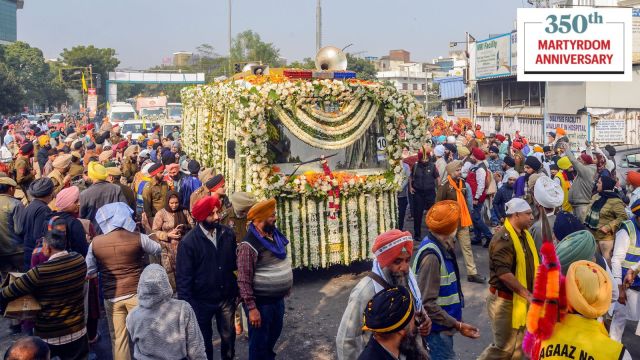Sikh scholar says Dec 10, Human Rights Day, should be dedicated to Guru Tegh Bahadur on his 350th martyrdom anniversary; here’s why
Guru Tegh Bahadur’s sacrifice perfectly aligns with the principles included in the UN’s Universal Declaration of Human Rights, says Sikh scholar and writer Gurcharanjit Lamba.
 Devotees participate in the Nagar Kirtan procession, commemorating the 350th martyrdom anniversary of Shri Guru Tegh Bahadur Sahib Ji, as it reaches Guru Nanak Mission Chowk, in Jalandhar. (ANI Photo)
Devotees participate in the Nagar Kirtan procession, commemorating the 350th martyrdom anniversary of Shri Guru Tegh Bahadur Sahib Ji, as it reaches Guru Nanak Mission Chowk, in Jalandhar. (ANI Photo)US-based Sikh scholar and writer Gurcharanjit Singh Lamba has written to the Shiromani Gurdwara Parbandhak Committee (SGPC) and several other organisations, urging them to request the United Nations to dedicate Human Rights Day, which is observed on December 10 every year, to Guru Tegh Bahadur in 2025.
Lamba argues that the ninth Sikh guru’s principles align remarkably with the Universal Declaration of Human Rights (UDHR) and that his sacrifice remains just as relevant today as it was 350 years ago. He further emphasises that the Government of India should take this proposal to the UN, highlighting to the world that the earliest and greatest victory for human rights occurred in 1675 at Chandni Chowk in Delhi, where Guru Tegh Bahadur gave his life to protect the religious freedom of Kashmiri Pandits.
Why does Guru Tegh Bahadur’s martyrdom hold global and historical significance when it comes to human rights?
Guru Tegh Bahadur laid down his life in 1675 to defend the right to freedom of religion, becoming Hind Di Chaadar (Shield of India). He gave his life not for his own community, but to protect the religious freedom of Kashmiri Pandits facing forced conversions under Mughal emperor Aurangzeb. There is no other example of such sacrifice in world history. The sacrifice was for the cause of dharma and righteousness.
“Guru Tegh Bahadur-ji’s message of ‘fear none, frighten none’ embodies the essence of universal human rights. His sacrifice predates, yet perfectly aligns with the principles later included in the UDHR adopted by the UN in 1948, particularly the freedoms of conscience, belief and religion,” says Lamba.
How does Guru Tegh Bahadur’s sacrifice embody the core principles of universal human rights?
The guru’s message of “fear none, frighten none” directly aligns with the modern understanding of human dignity, equality, and freedom of conscience. Lamba says that Articles 1 and 18 of the UDHR echo the very ideals Guru Sahib died for: “While Article 1 says that all human beings are born free and equal, Article 18 underlines that everyone has the right to freedom of thought, conscience and religion – including the right to change their religion, practise their faith and propagate it.”
“Exactly 273 years later, on December 10, 1948, the UN adopted the UDHR, signed by 48 countries, including India. The UDHR’s 30 articles are significant, but Articles 1 and 18 feel as though they were written with Guru Tegh Bahadur-ji’s philosophy of sacrifice as their foundation. The lesson Guru Tegh Bahadur-ji taught through his sacrifice was adopted in principle by the United Nations,” says Lamba.
Why is Guru Tegh Bahadur’s martyrdom deeply relevant to modern human rights challenges?
Despite 350 years having passed since his death, many of the issues that Guru Tegh Bahadur fought against — intolerance, forced conformity, and suppression of minorities — continue to plague the world, making his teachings deeply relevant to contemporary global society.
In practice, the world has failed to ensure adequate religious freedom and human rights protection. This remains a matter of concern. Every year, there are reports of human rights violations, including in India. Governments often dismiss these reports, claiming the authors lack understanding of local realities. Thus, Guru Tegh Bahadur’s martyrdom remains even more relevant.
Why should the UN and the Government of India dedicate this year’s Human Rights Day to Guru Tegh Bahadur?
According to Lamba, “This year is important because it marks the 350th anniversary of Guru Tegh Bahadur-ji’s martyrdom (observed on November 25). This recognition would honour the world’s most profound act of sacrifice for the freedom to practice another religion. It stands as a milestone in the struggle for human dignity, where one sacrificed his life for another’s faith. It would highlight that while the world acknowledges these principles, true protection of human rights still lags behind.”
He added that it will honour India’s own history, reaffirm constitutional values of equality, freedom and justice, and highlight the world’s earliest and most exemplary defence of human rights, while strengthening intercultural dialogue and educating younger generations on universal moral courage.







